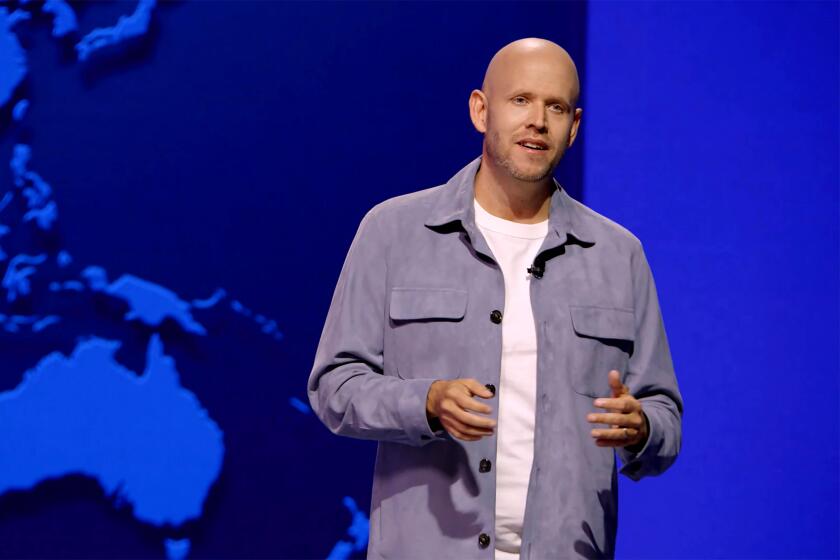Hollywood’s latest pilot: Moving DVDs from the home to the cloud
The movie industry took another halting step into the digital era this week when CinemaNow, an online movie rental service owned by BestBuy, rolled out a new service letting customers make digital copies of their DVDs. Kinda sorta.
The trial version of the service, which went live Thursday, is the first time the Hollywood studios have agreed to support something akin to DVD copying in the home. But it’s not every studio -- only Sony, Warner Bros., Universal and Lionsgate have signed on, leaving Disney and Paramount on the sidelines. And there are crucial limitations that may be deal-killers for many consumers, as my colleague Ben Fritz noted Friday morning.
Unlike the (legally questionable) DVD-ripping software that’s available online, CinemaNow’s service doesn’t let users copy their movies onto their home computer’s hard drive. Instead, for a fee of $2 to $5 per disc, the service adds titles to the consumer’s online accounts with CinemaNow and Ultraviolet -- an initiative by the studios to enable consumers to play digital files on multiple devices without encouraging piracy. The titles can then be streamed or downloaded (a limited number of times) to devices that can handle copy-protected Ultraviolet-compatible files.
The CinemaNow service, which is powered by technology from Rovi, is certainly an improvement over the in-store disc-to-digital service that Wal-Mart has been offering for about a year. But it pales in comparison to the consumer-friendly digital-copying products that the studios have fought in the past to block, such as RealNetworks’ RealDVD software and Kaleidescape’s high-end home movie servers. (Warner Bros. has since agreed to let Kaleidescape sell downloadable copies of the studio’s films.)
Still, the point for Hollywood isn’t to replicate what the unlicensed world is offering, it’s to compete with it. And what CinemaNow’s new service enables is pretty compelling: the ability to watch movies from your collection wherever you may be, whenever you want, with no need to cart around the DVDs. Ultraviolet also solves the potential compatibility issues faced by digital files -- there are UV apps for all the major software platforms, and those apps can play any UV streams or downloads. And the fact that it’s based in the cloud means that it backs up customers’ movies in addition to making them remotely accessible.
So what’s not to like? For some people, a file in hand is worth two in the cloud. They’d prefer to create a digital video jukebox in their home than to have one in the cloud under someone else’s control. And although UV apps are available for the most popular portable devices, playing a UV file on a living-room TV can be a challenge.
A more significant hurdle, though, is the fee. CinemaNow requires people to pay $2 for the right to stream or download a movie they’ve already purchased. The fee rises to $5 if they want to upgrade from DVD quality to high-def. That’s about how much it costs to rent a movie, so it doesn’t seem like a lot. But considering that DVDs cost only $10 to $15 to purchase, it’s a pretty hefty surcharge for the digital retrofit.
One reason the studios were reluctant to approve services like this in the past was their fear of “rent, rip and return” -- the idea that people would make permanent copies of the DVDs they rented from Netflix or Blockbuster, or borrowed from their friends. Improving disc-recognition technology has made that risk more acceptable, at least to some of the major studio executives. But they also have to acknowledge the reality of the Internet, where plenty of software is available to copy rented discs.
The real question is how much demand there is for the kind of portability that CinemaNow’s disc-to-digital service enables. Mainstream consumers quickly embraced the idea of moving their music collections to a hard drive, and prodded by Apple (and now Google), they’ll likely push those collections into the cloud. But people listen to songs and albums repeatedly; they don’t have the same relationship with their DVDs.
On the other hand, Apple’s iPad set off a tablet-buying frenzy that has equipped tens of millions of Americans with a movie-viewing screen that accompanies them far from their living rooms. Families used to tote portable DVD players on long trips; as those devices give way to tablets on planes and in back seats, the demand for digital movie files will grow.
There are plenty of ways to fill that demand, however. Amazon, Netflix and Hulu offer all-you-can-eat streaming services for a monthly fee, and many other companies offer downloadable or streamable movies and TV shows to rent or own. The more content that’s available through these ventures, the less demand there may be to convert a personal DVD collection into portable digital files.
I also wonder if an important step in the groundwork for digital movie files is missing. For the music industry, CD ripping was both a curse and a blessing. The curse was the explosion of file-sharing. The blessing was that ripping introduced people to the advantages of a new format (MP3s), laying the foundation for the downloadable music sales that have helped offset the decline in CD sales.
The copy protection on DVDs has deterred many people from doing the same thing with their movies that they did with their music discs. Seemingly everyone has a digitized music collection, and a whole industry of hardware and software has built up to take advantage of it. Very few people have a digitized movie collection. So mainstream consumers may struggle to see why they should bother with CinemaNow’s disc-to-digital service, particularly when they have to pay for it.
ALSO:
Samsung to unveil flexible display technology at CES
Minecraft documentary to stream Saturday on Xbox Live
Instagram’s most followed user, Kim Kardashian, might dump the app
Jon Healey writes editorials for The Times. Follow him on Twitter @jcahealey
More to Read
Inside the business of entertainment
The Wide Shot brings you news, analysis and insights on everything from streaming wars to production — and what it all means for the future.
You may occasionally receive promotional content from the Los Angeles Times.











